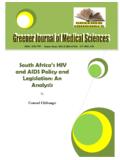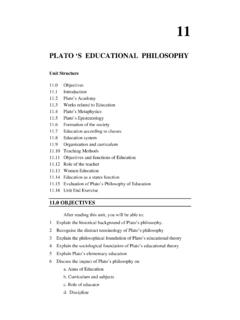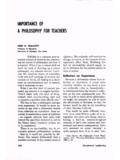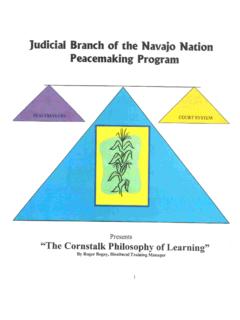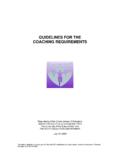Transcription of Philosophies and Perspectives in Education: …
1 ISSN: 2276-7789 Impact Factor 2012 (UJRI): ICV 2012: Philosophies and Perspectives in education : examining their Roles and Relevance in education By Wellington Samkange Cecilia Samkange Greener Journal of Educational Research ISSN: 2276-7789 Vol. 3 (10), pp. 454-461, December 2013. 454 Research Article Philosophies and Perspectives in education : examining their Roles and Relevance in education 1*Wellington Samkange and Cecilia Samkange2 1 Senior Lecturer: Faculty of Arts and education , Department of Educational Studies, Zimbabwe Open University, Box 1119 Mt. Pleasant, Harare.
2 Zimbabwe. 2 Teacher in Charge of the and Infant Department: Chegutu Primary School, Box 390 Chegutu. Zimbabwe. 2 Email: *Corresponding Author s Email: ABSRACT Different Philosophies have been used to guide and explain policies and practices in education . Such Philosophies include the philosophy of progressivism, and the Marxist philosophy. These are examined in this paper in relation to how they attempt to explain the role of education in society. The paper also examines the idea of developing and promoting an African Philosophy of education . The paper examines the philosophy of unhu/ubuntu as a way of advancing the African Philosophy of education within the Zimbabwean context.
3 An examination of the Early Childhood Development (ECD) was made as a way of attempting to establish the extent to which the curriculum has been guided by any of the Philosophies discussed. The paper argues that the different Philosophies of education should be used as a basis for developing an African Philosophy of education . As such, the Philosophy of Unhu/Ubuthu should be fully incorporated into the education curriculum. Keywords: Progressivism, Philosophy of education , African Philosophy of education , Unhu/ubuntu, Early Childhood Development. INTRODUCTION The paper identifies and discusses different Philosophies of education . These are discussed in relation to their relevance to the new scientific paradigm in education .
4 Early philosophers such as John Dewey, Jean Jacques Rousseau and their philosophy of progressivism, and the Marxist philosophy of education are used here to bring the discussion into its context. An examination of the Early Childhood Development (ECD) curriculum in Zimbabwe is done to accentuate its role within the context of the African Philosophy of education . At the same time it is used as a case to measure the extent to which the African Philosophy of education has been embedded in the new scientific paradigm in education . The philosophy of unhu/ubuntu is discussed as an example of African Philosophy of education . John Dewey and Jean Jacques Rousseau: The Philosophy of Progressivism John Dewey was one of the major proponents of the philosophy of progressivism.
5 It was established in the 1920s in the United States of America. It notes that the child should be the centre of our planning in education . In order for children to benefit from education it should be related to their needs. According to the philosophy of John Dewey experimentation by children as they learn allows them to try new ideas. The children should be allowed to discover answers to problems through their interaction with the physical and social environment. Such an approach is seen as developing thinking and problem solving skills in children. Progressivism in education is seen as promoting creativity and freedom among children. Children should be able to use the different tools that support their education . It is not the books that determine what children learn, but rather children have the power to decide.
6 Progressivism was guided by Dewey s philosophy of pragmatism and experimentalism. Through these, Dewey came up with four stages that apply to experimentalism. These are identification of a problem, coming up with a hypothesis, experimental testing and inductive argument. It is the child who is involved in all these stages. According to Darling (1994), progressivism in education emphasizes a number of qualities that are important for the development of the child. These include experimental learning, emphasis on problem solving and critical Greener Journal of Educational Research ISSN: 2276-7789 Vol. 3 (10), pp. 454-461, December 2013. 455 thinking, group work and development of social skills, education for social responsibility and democracy, accommodating each child s personal goal and placing emphasis on different resources rather than textbooks.
7 According to Dewey knowledge is a social construct and the duty of teachers and society is to help children construct their own learning. The teacher is therefore a member of the community who should assist in the development of the child without being authoritarian. The curriculum should reflect the values of society and these should be continuously developed. Dewey was therefore concerned with participatory learning. Dewey as cited by Vashishtha et al. (2011) argued that action must precede knowledge and that knowledge is a result of the child s activities with the environment. Furthermore they note that the function of education according to Dewey was to help children grow into happy, moral and efficient human beings.
8 On the curriculum, Dewey noted that it had to grow out of the child s interests. Vashishtha et al. (2011) identify the main characteristics and principles of the curriculum, which include the need for the curriculum to reflect the social life and social activities. As such, the curriculum should follow progressive organization of knowledge based on the educative experiences and problems of the learner, which should be flexible. Apart from his concern for the curriculum, Dewey was equally concerned with the role of the teacher, methods of teaching and discipline. Under the philosophy of progressivism, Dewey recommended three methods of teaching. These were learning by doing, learning by integration and learning through productive and creative activities (ibid).
9 The teacher was there to guide the children and discipline would be derived from the activities the children engaged in. Jean Jacques Rousseau was viewed as the Father of Progressivism. Dewey s ideas on children s education were not as radical as Rousseau s. As noted by Darling (1994:10), Rousseau argued that the study of the child should be made the foundation on which a sound education is built, and such a study shows that much of the subject matter of conventional education is taught at an inappropriately early age . In that regard, formal teaching has to be delayed until the child is ready. Rousseau identified the main sources of education as nature, men and circumstances. For Rousseau, it is the adults who spoil children through their teachings.
10 As such, he advocates for negative education , where children are guided against evil. In Darling (1994) Rousseau divides the aims of education according to stages of human development. These stages are the infancy, childhood, preadolescent period and adolescent period. At the first two stages of development the emphasis was on development and attainment of freedom. These are the stages that are covered by the Early Childhood Development (ECD) programme in Zimbabwe. On the curriculum, Rousseau believed that it should be related to the age groups referred to above. At 0 to 5 years the curriculum should be concerned with the physical development of the child and the second stage should be concerned with the development of senses.


